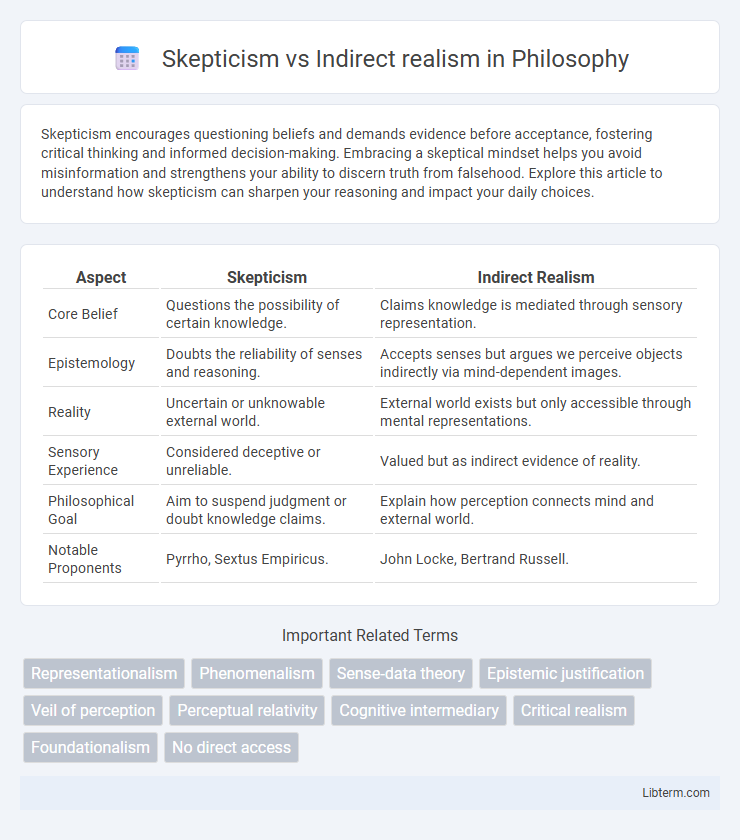Skepticism encourages questioning beliefs and demands evidence before acceptance, fostering critical thinking and informed decision-making. Embracing a skeptical mindset helps you avoid misinformation and strengthens your ability to discern truth from falsehood. Explore this article to understand how skepticism can sharpen your reasoning and impact your daily choices.
Table of Comparison
| Aspect | Skepticism | Indirect Realism |
|---|---|---|
| Core Belief | Questions the possibility of certain knowledge. | Claims knowledge is mediated through sensory representation. |
| Epistemology | Doubts the reliability of senses and reasoning. | Accepts senses but argues we perceive objects indirectly via mind-dependent images. |
| Reality | Uncertain or unknowable external world. | External world exists but only accessible through mental representations. |
| Sensory Experience | Considered deceptive or unreliable. | Valued but as indirect evidence of reality. |
| Philosophical Goal | Aim to suspend judgment or doubt knowledge claims. | Explain how perception connects mind and external world. |
| Notable Proponents | Pyrrho, Sextus Empiricus. | John Locke, Bertrand Russell. |
Introduction to Skepticism and Indirect Realism
Skepticism challenges the reliability of sensory perceptions, questioning the possibility of obtaining certain knowledge about the external world. Indirect realism, a theory in epistemology, posits that we do not perceive objects directly but rather through mental representations caused by external objects. This contrast highlights the foundational debate around the nature of perception and the limits of human knowledge.
Defining Skepticism: Philosophical Roots
Skepticism, rooted in ancient Greek philosophy, challenges the possibility of certain knowledge by questioning the reliability of sensory perceptions and the external world. Originating from Pyrrhonism and Academic Skepticism, it asserts that human knowledge is inherently uncertain and that true certainty is unattainable. This philosophical stance contrasts with indirect realism by emphasizing persistent doubt about whether perceptions accurately represent external objects.
What is Indirect Realism?
Indirect realism posits that humans do not perceive the external world directly but through mental representations or sense data caused by external objects. This theory contrasts with skepticism, which questions the possibility of any certain knowledge about the external world. Indirect realism maintains that while our perceptions are mediated, they are still reliably connected to the external reality through causal processes.
Historical Context: Key Thinkers and Debates
Skepticism and indirect realism emerged as pivotal positions in the early modern period, with key thinkers like Rene Descartes and George Berkeley spearheading debates on the nature of perception and reality. Descartes' radical doubt questioned the reliability of sensory experiences, laying groundwork for skepticism, while Berkeley's immaterialism indirectly supported aspects of indirect realism by emphasizing perception as mediated by the mind. These historical debates shaped subsequent epistemological inquiries into how humans access external reality through representational states, influencing philosophers such as John Locke and David Hume.
Core Differences: Skepticism vs. Indirect Realism
Skepticism questions the possibility of truly knowing the external world, arguing that all perceptions could be deceptive and thus, knowledge is uncertain. Indirect realism, however, asserts that while we do not perceive objects directly, our sensory experiences are caused by and represent external objects existing independently. The core difference lies in skepticism's doubt about any justification for knowledge, whereas indirect realism accepts perceptual mediation but maintains that it reliably connects us to reality.
Arguments Supporting Indirect Realism
Indirect realism argues that sensory experiences represent the external world through mental representations or sense data, providing a coherent explanation for perceptual variation and illusions. This theory maintains that while we do not perceive objects directly, the mediated perception guarantees an external reality independent of our minds, addressing skepticism about immediate access to the external world. Empirical evidence from neuroscience supports indirect realism by showing how the brain processes sensory input to create coherent internal representations, reinforcing the distinction between perception and external objects.
Skeptical Challenges to Indirect Realism
Skeptical challenges to indirect realism argue that since we only experience mental representations or sense-data, we cannot be certain that these accurately correspond to an external reality, leading to doubts about the existence or nature of the physical world itself. This skepticism targets the reliability of perceptual knowledge, emphasizing the possibility of illusions, hallucinations, or deception that undermine indirect realism's claim that perceptions represent external objects. The challenge forces indirect realists to defend the causal connection between external objects and perceptual experiences to justify knowledge of the external world.
Epistemological Implications
Skepticism challenges the possibility of certain knowledge, questioning whether our perceptions truly represent an external reality. Indirect realism posits that we only access the external world through mental representations, which may introduce biases or distortions. This epistemological tension highlights the difficulty in establishing a secure foundation for knowledge, as indirect realism accepts perceptual mediation while skepticism demands proof of its reliability.
Contemporary Perspectives and Relevance
Contemporary perspectives on skepticism and indirect realism emphasize the challenge of accessing an external world distinct from perceptual representations, with skepticism questioning the certainty of such knowledge. Indirect realism posits that perception involves mental intermediaries, maintaining belief in an external reality while acknowledging the potential for error. This debate remains relevant in cognitive science and philosophy of mind, influencing discussions on perception, consciousness, and the limits of human knowledge.
Conclusion: Bridging Skepticism and Indirect Realism
Skepticism challenges the reliability of sensory knowledge, questioning whether our perceptions correspond to an external reality. Indirect realism acknowledges the mediation of sensory data by mental representations, accepting a layer between perception and the world itself. Bridging skepticism and indirect realism involves recognizing that while direct access to reality is uncertain, coherent internal models, grounded in consistent sensory inputs, provide a justified basis for knowledge despite inherent perceptual limitations.
Skepticism Infographic

 libterm.com
libterm.com